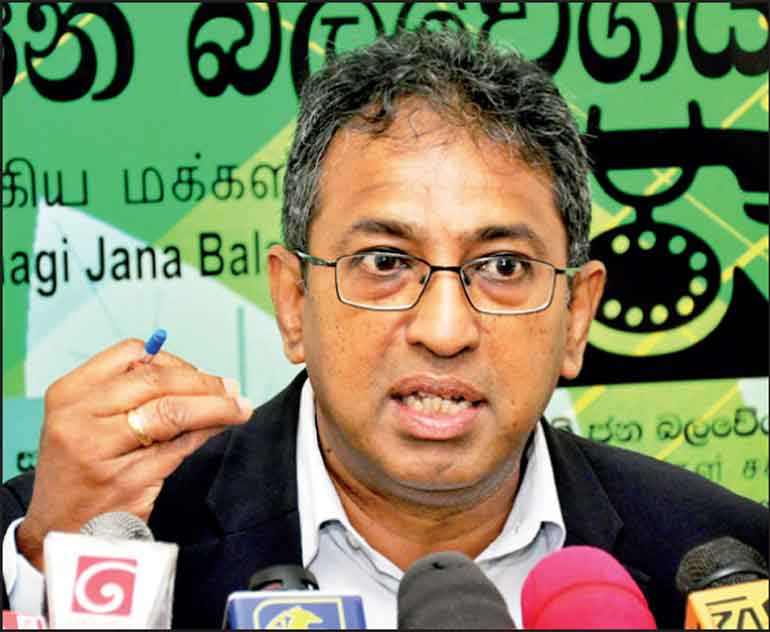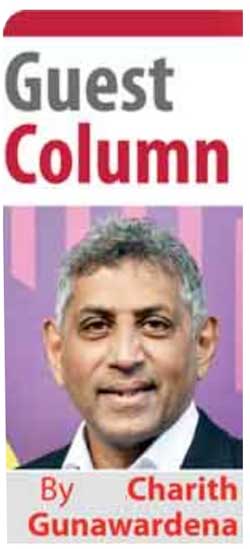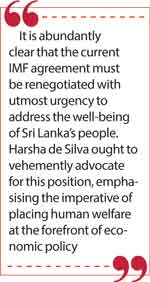Monday Feb 16, 2026
Monday Feb 16, 2026
Friday, 19 April 2024 00:20 - - {{hitsCtrl.values.hits}}

Harsha de Silva
 Harsha de Silva, Member of Parliament and Chair of the Parliament Committee on Public Finance (COPF), addressed the media in Sinhala, on 17 April 2024, shedding light on the recent breakdown of debt restructuring talks between the Sri Lankan Government and the international bondholders’ “steering committee”.
Harsha de Silva, Member of Parliament and Chair of the Parliament Committee on Public Finance (COPF), addressed the media in Sinhala, on 17 April 2024, shedding light on the recent breakdown of debt restructuring talks between the Sri Lankan Government and the international bondholders’ “steering committee”.
These confidential negotiations, conducted behind closed doors, aimed to restructure over $ 12 billion of debt. However, they faltered due to discrepancies between the bondholders’ proposed “baseline” assessments and the absence of a contingency plan to address ongoing economic fragility. Notably, the parameters outlined in the bondholders’ plan diverged from those outlined in the Government’s IMF program.
De Silva expressed dismay over the lack of transparency in the Government’s approach to debt restructuring and rightly criticised the exclusion of opposition members from the discussions. He emphasised the significance of involving all stakeholders, as it would ultimately be the responsibility of the next government to uphold any agreements reached.
Subservience to global money markets
De Silva underscored the sobering reality that any future government’s attempt to renegotiate the IMF agreement would likely face insurmountable obstacles. He pointed out that rating agencies would likely respond with downgrades to Sri Lanka, and global commercial markets would resist such actions, illustrating the entrenched dynamics of the global financial system.
Amidst these challenges, there has been a growing public call for a thorough sovereign debt audit to precede any agreement. Shockingly, despite accumulating Rs. 8 trillion in debt, only Rs. 2 trillion worth of assets can be clearly identified. This alarming revelation has fuelled public debates about the necessity of transparency and accountability in Sri Lanka’s financial affairs.
The missing trillions, held by both domestic and foreign entities, cast a shadow of mystery over Sri Lanka’s financial landscape. The beneficiaries and current holders of international sovereign bonds remain concealed, emblematic of the opacity plaguing the global financial system. This unjust order facilitates the laundering of ill-gotten gains, burdening Sri Lanka with odious debts amassed through transactions in global money markets.
Private creditors, awash with liquidity injected by the central banks of the global north, operate with impunity, profiting from predatory lending practices shielded by a veil of secrecy. The absence of a UN-led global sovereign bankruptcy mechanism exacerbates the plight of nations in the global south, leaving them vulnerable to the whims of private creditors who dictate terms without accountability.
In the face of this daunting reality, Sri Lanka stands in urgent need of a truly sustainable solution to its debt crisis. It cannot afford to repeat the mistakes that have led to 17 IMF programs, each emblematic of a global financial architecture skewed in favour of the powerful nations of the global north.
Experienced statesmen like Harsha de Silva play a pivotal role in guiding Sri Lanka through these turbulent waters. Their responsibility lies in articulating to the people of Sri Lanka how the nation can navigate the treacherous currents of the unjust global economic order and forge a path towards financial stability and sovereignty.
Tail wagging the dog
Harsha de Silva, however, may need to reassess his fundamental perspective on the country’s challenges. While the economy undeniably holds significant importance, it must be reoriented to prioritise the well-being of both people and the environment. The failure to do so has resulted in – and will continue to cause – widespread suffering among the populace.
Unfortunately, the IMF has consistently espoused an ideological stance that prioritises economic metrics that give primacy to financier interests over human welfare. Moreover, the opacity surrounding the IMF Debt Sustainability Analysis raises doubts about the efficacy of its proposed solutions. There is a glaring lack of transparency regarding the methodology, parameters, and assumptions underlying these analyses, leaving citizens in the dark about whether the prescribed plan will genuinely lead Sri Lanka toward sustainable recovery.
Key aspects of the IMF agreement compound the hardship faced by Sri Lankans. For instance, the paltry allocation of just 0.6% of GDP to the social safety net is woefully inadequate, while the hefty requirement of dedicating 4.5% of GDP (over a third of government revenue) to debt servicing perpetuates regressiveness. Additionally, plans to re-engage with global money markets in 2027 risk ensnaring the country in a perpetual debt trap.
 The enactment of the new Central Bank Act further exacerbates the country’s woes by siphoning essential financial resources away from driving vital industrial (yet ecologically sensitive) growth. Meanwhile, the removal of fuel subsidies disproportionately burdens SMEs, daily wage earners and children. Furthermore, chronic underinvestment in critical state-owned enterprises only serves to exacerbate their inefficiencies.
The enactment of the new Central Bank Act further exacerbates the country’s woes by siphoning essential financial resources away from driving vital industrial (yet ecologically sensitive) growth. Meanwhile, the removal of fuel subsidies disproportionately burdens SMEs, daily wage earners and children. Furthermore, chronic underinvestment in critical state-owned enterprises only serves to exacerbate their inefficiencies.
It is abundantly clear that the current IMF agreement must be renegotiated with utmost urgency to address the well-being of Sri Lanka’s people. Harsha de Silva ought to vehemently advocate for this position, emphasising the imperative of placing human welfare at the forefront of economic policy.
Financialisation of everything must stop
Sri Lanka’s economic turmoil stems from a nexus of local corruption (inclusive of corporate corruption), governance deficiencies, and mismanagement. Despite numerous instances of corruption, such as the bond scam, sugar scam, tsunami scam, Sathosa scam, and Immunoglobin scam and many more, investigations and holding relevant parties accountable have been lacking under successive administrations.
The inertia in addressing these issues is exacerbated by a lack of enforcement of existing laws and a tendency for Governments to pass superficial legislation without ensuring independent judicial and law enforcement systems. Future government officials must demonstrate transparency regarding their involvement or oversight of these scandals during their tenure.
Rebuilding public trust in the Government’s commitment to combat corruption and improve governance is paramount. A genuine dedication to reform should not hinge on IMF conditionalities but should be intrinsic to the Government’s agenda.
Further entrenching Sri Lanka in financial obligations through instruments like MLBs (Macro-Linked Bonds), ESGs (Environmental, Social and Governance Bonds) or Debt-for-Nature Swaps may not align with the country’s goals, particularly if they perpetuate dependence on private creditors and global financial markets. Instead, a focus on restructuring or cancelling private debt, coupled with a robust industrial strategy, could pave the way for sustainable economic recovery.
Collaborating with other nations in the Global South to challenge financial exploitation and advocating for a fairer global economic order is imperative. Harsha de Silva’s acknowledgment of the failure of trickle-down economics, the need for a sustainable industrial strategy (for value-added exports and domestic substitutes), and the imperative to renegotiate IMF agreements would signal a step in the right direction.
Ultimately, a concerted effort by a future government to confront corruption, prioritise the interests of its citizens, and renegotiate detrimental financial agreements is essential for Sri Lanka’s path to economic stability and sovereignty.
(The writer is a co-founder of the Institute for Political Economy (www.ipe-sl.org) and a former elected Local Councillor for London in the United Kingdom. He could be reached via email [email protected].)